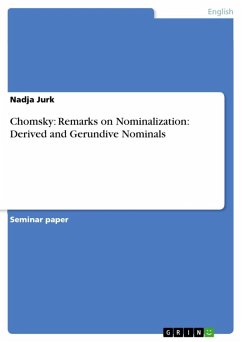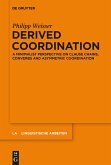Seminar paper from the year 2001 in the subject American Studies - Linguistics, grade: 1,3 (A), University of Stuttgart (Institute for Linguistics), course: Topics in the Syntax-Morphology Interface, language: English, abstract: 1. Introduction The American linguist and philosopher Noam Chomsky is seen as one of the most important developers of language theories. He has composed and published many literary works that have been dispersed worldwide. He has worked to further the study and understanding of linguistics from both the biological and psychological perspective. This termpaper mainly refers to Chomsky's essay "Remarks on Nominalization" , published in 1970. In this essay he discusses the major structural differences between "gerunds" ( verbal nouns like in "John being easy to please", or "John interesting the children with his stories") and "derived nominals" (regular nouns like in "the destruction of the city"). "Among various types of nominal expressions in English there are two of particular importance, each roughly of propositional form...the gerundive nominals...and the derived nominals..." In my termpaper I am going to comment exactly on those two linguistic phenomenons: gerundive nominals vs. derived nominals. In order to comprehend Chomsky's analysis I will have to provide some general assumptions about syntax, the lexicon and the approaches Chomsky uses in his article. [...]
Dieser Download kann aus rechtlichen Gründen nur mit Rechnungsadresse in A, B, BG, CY, CZ, D, DK, EW, E, FIN, F, GR, HR, H, IRL, I, LT, L, LR, M, NL, PL, P, R, S, SLO, SK ausgeliefert werden.









